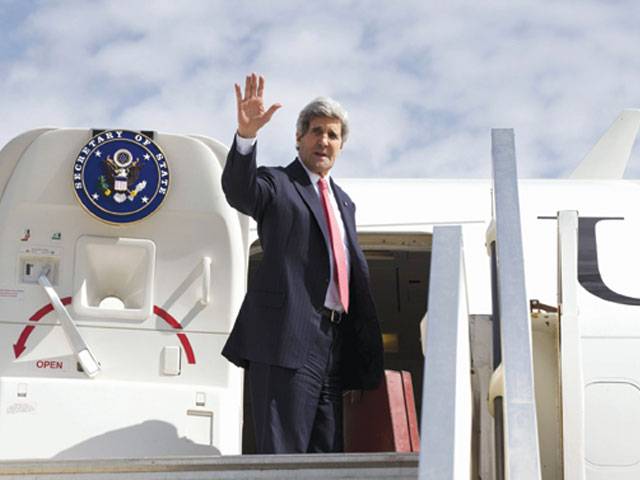JERUSALEM - Washington's top diplomat met Israel's Benjamin Netanyahu Tuesday for the second time in 12 hours, as sources said a jailed US-Israeli spy could be key to saving troubled peace talks.
US peace efforts are teetering on the brink of collapse after Israel refused to free a group of 26 veteran Palestinian prisoners under an agreement that brought the sides back to the negotiating table in July 2013. Furious Palestinian officials - who had agreed to freeze all efforts to secure international recognition for the duration of the peace talks - have warned that unless Israel changes its stance on the prisoner releases, it could signal the end of the talks.
US efforts to salvage the negotiations moved into high gear on Monday when US Secretary of State John Kerry flew in for a 15-hour visit which saw him meeting twice with the Israeli prime minister.
Although Kerry was scheduled to leave for a NATO meeting in Brussels on Tuesday morning, a senior Palestinian source said he would return to the region within 24 hours for talks with Palestinian president Mahmud Abbas.
"Kerry will fly to Europe today for previous engagements and will come back to meet the president tomorrow at noon (0900 GMT)," the Palestinian source told AFP.
A scheduled late-night meeting with Abbas on Monday was cancelled after the Netanyahu meeting dragged on too late, US officials said, with Kerry instead holding talks at his Jerusalem hotel with Palestinian chief negotiator Saeb Erakat.
Separate sources close to the negotiating teams confirmed that Washington is discussing the release of US-born Israeli spy Jonathan Pollard as a way to break the deadlock.
Pollard was arrested in Washington in 1985 and sentenced to life imprisonment for spying on the United States on behalf of Israel. One proposal could see Pollard freed before the week-long Jewish holiday of Passover, which begins in mid-April.
In exchange, Israel would unblock the release of two dozen Palestinian prisoners and agree to free even more, and both parties would agree to extend the talks beyond an April 29 deadline.
State Department spokeswoman Jen Psaki however refused to be drawn, telling reporters: "Jonathan Pollard was convicted of espionage and is serving his sentence. I do not have any update for you on his status."
The peace talks, which have so far yielded no obvious results, are due to draw to a close at the end of April and US efforts are currently focused on getting the parties to agree an extension to the end of the year.
But US officials insist things are moving, saying only that there are a lot of complex pieces to put in place.
Kerry appears to be shifting his focus away from reaching a framework agreement, and towards an arrangement to simply keep the sides talking until later in the year.
But the question of extending the talks has become intricately tied up with the fate of the 26 prisoners.
Israel has said it will not free detainees convicted of deadly attacks unless the Palestinians commit to extending the negotiations.
But the Palestinians say they will not even discuss any extension of the negotiating period unless Israel frees the prisoners.
The Palestinians on Monday gave Kerry a 24-hour deadline to come up with a solution to the row, warning that a failure to do so would see them turning to UN bodies to press their claims for statehood.
"If we don't get an answer from John Kerry on the prisoners tonight, we'll begin to ask for membership in all UN agencies tomorrow (Tuesday)," independent lawmaker Mustafa Barghuti told AFP following a key leadership meeting in Ramallah.
The Palestinian leadership also agreed there would be no extension of the peace talks without a "comprehensive" freeze on Israeli settlement construction in the West Bank, including annexed east Jerusalem, two separate sources told AFP.
After landing at Tel Aviv airport on Monday, Kerry headed straight to Jerusalem for a two-hour meeting with Netanyahu. The two met again over breakfast for talks lasting well over two hours.
Saturday, April 20, 2024
Kerry wraps up whirlwind Israel visit

Caption: Kerry wraps up whirlwind Israel visit
Heavy rains claim 98 lives, 89 injuries, across Pakistan: NDMA
1:21 PM | April 20, 2024
Watercourse project to help increase crop yields in Punjab
12:57 PM | April 20, 2024
Justice Ishtiaq Ibrahim sworn in as PHC chief justice
12:54 PM | April 20, 2024
Policitising Tragedy
April 20, 2024
Tehran to Rafah
April 20, 2024
A New Leaf
April 20, 2024
A Tense Neighbourhood
April 19, 2024
Dubai Underwater
April 19, 2024
Dangers of Deepfakes
April 20, 2024
Feudalism
April 20, 2024
Kite tragedy
April 19, 2024
Discipline dilemma
April 19, 2024
Urgent plea
April 19, 2024
ePaper - Nawaiwaqt
Advertisement
Nawaiwaqt Group | Copyright © 2024





